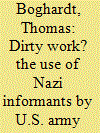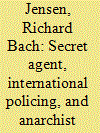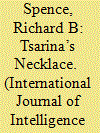|
|
|
Sort Order |
|
|
|
Items / Page
|
|
|
|
|
|
|
| Srl | Item |
| 1 |
ID:
138442


|
|
|
|
|
| Summary/Abstract |
After World War II ended in 1945, U.S. Army intelligence agencies, especially the Counter Intelligence Corps, recruited former Nazi officials, war crimes suspects, and war criminals to collect information on communist party and Soviet activities in Europe. While studies have examined individual cases, this article seeks to establish the historical context of the early Cold War that set the framework for this intelligence exploitation. It also weighs the intelligence value of the Army’s Nazi informants and reviews recruitment by other American and Allied intelligence services. Finally, it discusses the challenges of using ethical guidelines in recruiting secret agents, during the early Cold War and beyond.
|
|
|
|
|
|
|
|
|
|
|
|
|
|
|
|
| 2 |
ID:
156902


|
|
|
|
|
| Summary/Abstract |
An unprecedented expansion of global anti-terrorist policing took place after 1900, although the security forces projected outside their borders by Russia, Italy, Germany, Austria-Hungary, Spain, and Argentina displayed an enormous diversity in size and effectiveness. Crucial to successful policing was how these countries improved their intelligence through recruiting and handling informers, maintained secrecy and good relations with local police, and handled the media. The British approach to anarchist control was arguably the most successful. Italian international policing was the most far-reaching, while the United States long remained the world's most under-policed large country. On examination, the view that anti-anarchist policing was a case of conservative imperial regimes versus the Western democracies loses validity. During this period, a general trend saw the transfer of anarchist surveillance from the hands of diplomats into those of interior ministry officials and the police, all in the name of greater centralization, professionalization, and efficiency.
|
|
|
|
|
|
|
|
|
|
|
|
|
|
|
|
| 3 |
ID:
140645


|
|
|
|
|
| Publication |
Munich, William Morrow and Company Inc., 1973.
|
| Description |
528p.hbk
|
|
|
|
|
|
|
|
|
|
|
|
Copies: C:1/I:0,R:0,Q:0
Circulation
| Accession# | Call# | Current Location | Status | Policy | Location |
| 013119 | 940.5485/PIE 013119 | Main | On Shelf | General | |
|
|
|
|
| 4 |
ID:
171059


|
|
|
|
|
|
|
|